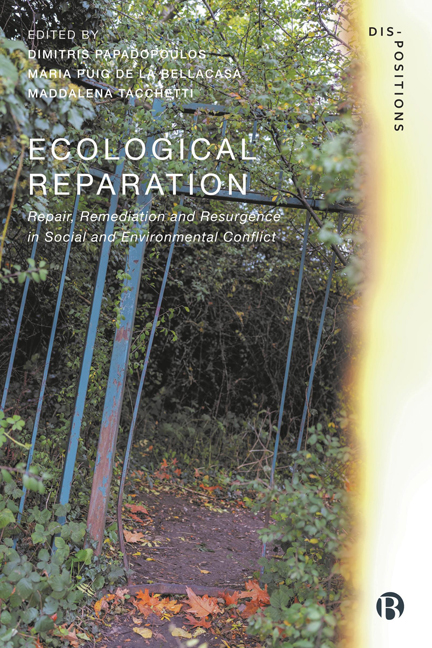Book contents
- Frontmatter
- Contents
- List of Figures
- Notes on Contributors
- Acknowledgements
- Note on the Figures
- Dis-Positions Series Preface
- Introduction: No Justice, No Ecological Peace: The Groundings of Ecological Reparation
- PART I Depletion<>Resurgence
- PART II Deskilling<>Experimenting
- PART III Contaminating<>Cohabiting
- PART IV Enclosing<>Reclaiming Land
- PART V Loss<>Recollecting
- PART VI Representing<>Self-governing
- PART VII Isolating<>Embodying
- PART VIII Growth<>Flourishing
- Index
11 - Land Reparations and Ecological Justice: An Interview with Sam Siva
Published online by Cambridge University Press: 28 March 2024
- Frontmatter
- Contents
- List of Figures
- Notes on Contributors
- Acknowledgements
- Note on the Figures
- Dis-Positions Series Preface
- Introduction: No Justice, No Ecological Peace: The Groundings of Ecological Reparation
- PART I Depletion<>Resurgence
- PART II Deskilling<>Experimenting
- PART III Contaminating<>Cohabiting
- PART IV Enclosing<>Reclaiming Land
- PART V Loss<>Recollecting
- PART VI Representing<>Self-governing
- PART VII Isolating<>Embodying
- PART VIII Growth<>Flourishing
- Index
Summary
Dimitris and Maria: We would like to thank you again, Sam, for contributing your text ‘Land in Our Names: Building an Anti-racist Food Movement’ to this book and accepting to follow up with an interview. We reached out to you for an intervention because we felt your voice and the work of LION are absolutely necessary for this book. We are immensely grateful for your time as we know how precious and precarious activist time is. To start maybe we would like to ask a bit more about LION about the organization, how you work, and about your plans.
Sam: So Land in Our Names is a collective of BPOC. We are an antiracist, land justice collective using a reparative justice framework to achieve land reparations, and increased access and support for BPOC to land and farming and nature more generally. An example of what we have been doing recently is a micro-grant programme (up to £1000) providing support to BPOC who want to get into growing or already do it as a hobby, or who want to follow related courses or have projects, who want to set up projects and so on. We also organize events about gardening or growing, skill sharing or just healing spaces where BPOC come together, connect with each other to learn in London, the city where most of us are based. We have also done a lot of research around access to food growing as a livelihood. Our eventual goal is to get some land to set up a BPOC land cooperative, a land cooperative, where we’re growing food, creating a space for people to rest and heal, that’s in the works. We’re quite young, we’ve only been around for two years and we’re doing quite a lot of stuff all the time, and have changed formations a lot, but, yeah, it’s great.
Dimitris and Maria: We have been following LION’s work and different interventions about your vision and have felt inspired and challenged to think and act. We strongly felt we couldn’t speak about ecological reparation in Britain today without including the voices, ideas and struggles you stand for. So maybe right away we’d like to ask if, and how, the notion of “ecological reparation” that we are trying to explore in this project resonates with you and your work.
- Type
- Chapter
- Information
- Ecological ReparationRepair, Remediation and Resurgence in Social and Environmental Conflict, pp. 164 - 174Publisher: Bristol University PressPrint publication year: 2023

